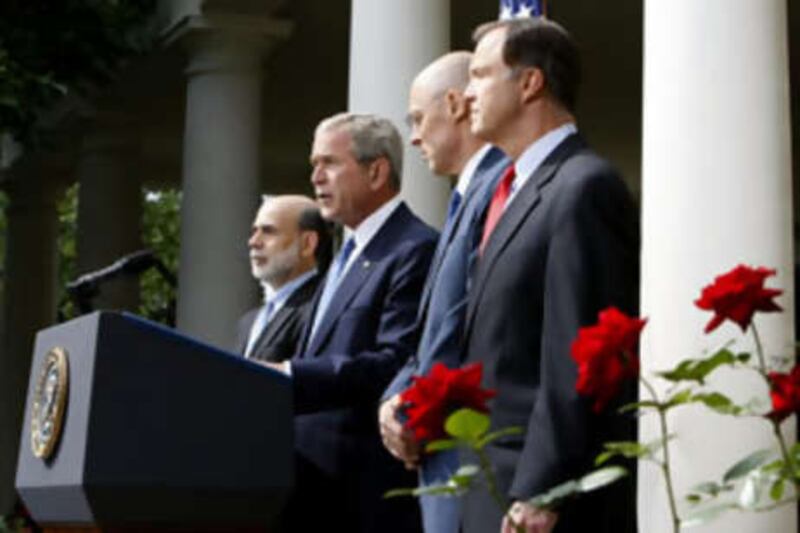NEW YORK // The US government curbed short-selling and guaranteed money-market mutual funds yesterday as it worked on a sweeping bailout to mop up hundreds of billions of dollars in toxic mortgage debt, sending global stock markets soaring. The moves capped a week in which financial markets faced their most serious confluence of crises since the Great Depression in the 1930s and threatened national economies and the worldwide banking system.
"This is a pivotal moment for America's economy," the US president George W Bush said. "Given the precarious state of today's financial markets, and their vital importance to the daily lives of the American people, government intervention is not only warranted, it is essential." Lawmakers promised fast action on the toxic-debt plan, which two banking industry sources put in the US$500 billion (Dh1.8 trillion) to $800 billion range. A treasury spokeswoman declined to comment.
Government officials said they had a lot of work to do. "This needs to be big enough to make a real difference and get at the heart of the problem," treasury secretary, Henry Paulson, said. As the US government brought out the big guns to tackle the mounting financial crisis, the investment bank Morgan Stanley bought itself some time to come up with a plan for its future and continued talking to Wachovia Corp and other banks about a merger.
Yesterday, a US bankruptcy judge approved the British bank Barclays deal to purchase the core US business of Lehman Brothers. But much of the markets' focus was on Washington, as officials from the Bush administration, congress and the Federal Reserve worked to craft a number of plans to restore confidence in shaken stock markets. The US government has pledged more than $1tn to prop up the financial system and housing market.
In the most recent example of a government entity stepping in to ease fears, the US Treasury said yesterday it would use $50b to back money-market mutual funds whose asset values fell below $1 in another step to contain the raging financial turmoil. "The government is trying to stop a domino effect of more institutions failing, and taking others down," said Blake Howells, director of equity research at Becker Capital Management in Oregon.
US stocks soared yesterday as the Dow Jones industrial average closed up 368.8 points, or 3.4 per cent, at 11,388.4, and the Nasdaq rose 74.8, or 3.4 per cent, to 2,273.9. Other global markets also reacted sharply. Banks worldwide have suffered more than $500bn of write-downs and loan losses since the global credit crisis began more than a year ago. The crisis grew more acute this month, with government takeovers of the mortgage companies Fannie Mae and Freddie Mac; the bankruptcy of Lehman Brothers; Merrill Lynch's shotgun agreement to be bought by Bank of America Corp; and a bailout of the insurance giant AIG.
This came just six months after a government-backed rescue of Bear Stearns. Government officials have indicated their willingness to do what they can to prevent a major financial institution from going under and roiling the overall markets. "The optimism surrounding the Treasury plan is justified but it should be noted that economic recovery is several quarters ahead. The credit crunch and household balance sheet position will both play a critical role in how soon the economy gathers steam," Asha Bangalore, an economist at Northern Trust in Chicago, said.
After Britain's Financial Services Authority (FSA) imposed a four-month ban on short-selling financial stocks on Thursday, the US Securities and Exchange Commission followed suit yesterday with an immediate 10-day ban. While many on Wall Street cheered the ban on short-selling, the sentiment was not unanimous. Options traders, who sell stock short to balance their trading positions, were caught off guard and warned that the measure could paralyse derivatives markets.
The main complaint was that the clamp down was a knee-jerk reaction that will not fix the banking sector's underlying weaknesses, said to be a pile of bad debts, hard-to-value mortgage securities and a breakdown of investor confidence. Alan Greenspan, the former Fed chairman, called the ban "a terrible idea". "It's like having a heart attack, and you go and get your chest cracked open and get it fixed, but the next morning you're still hurting," said Warren Simpson, managing director at Stephens Capital Management in Arkansas. "This has been a beast of biblical proportions. Nobody has seen anything like it." * Agencies






